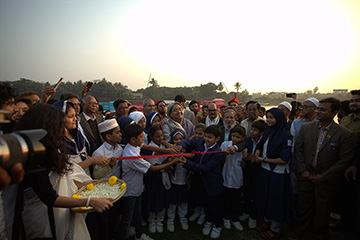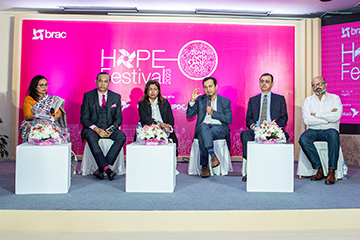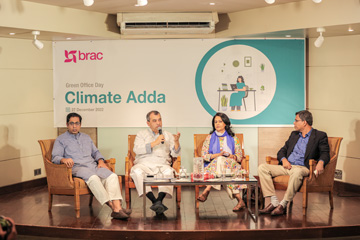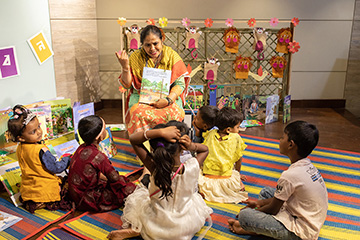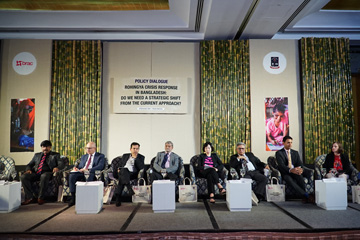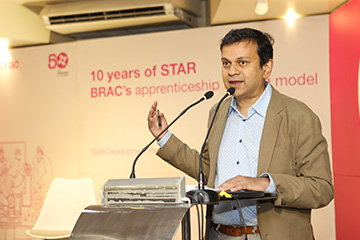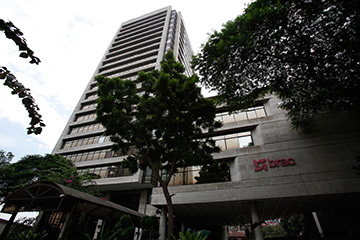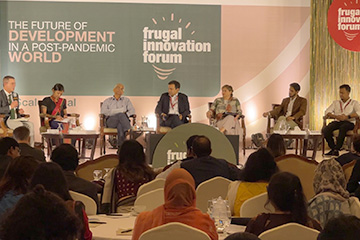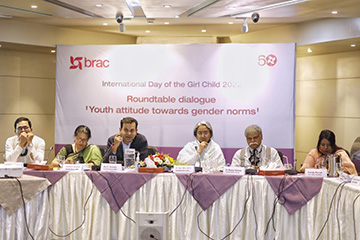
English (961)
Children categories
BRAC fun learning boats for children inaugurated in Chandpur
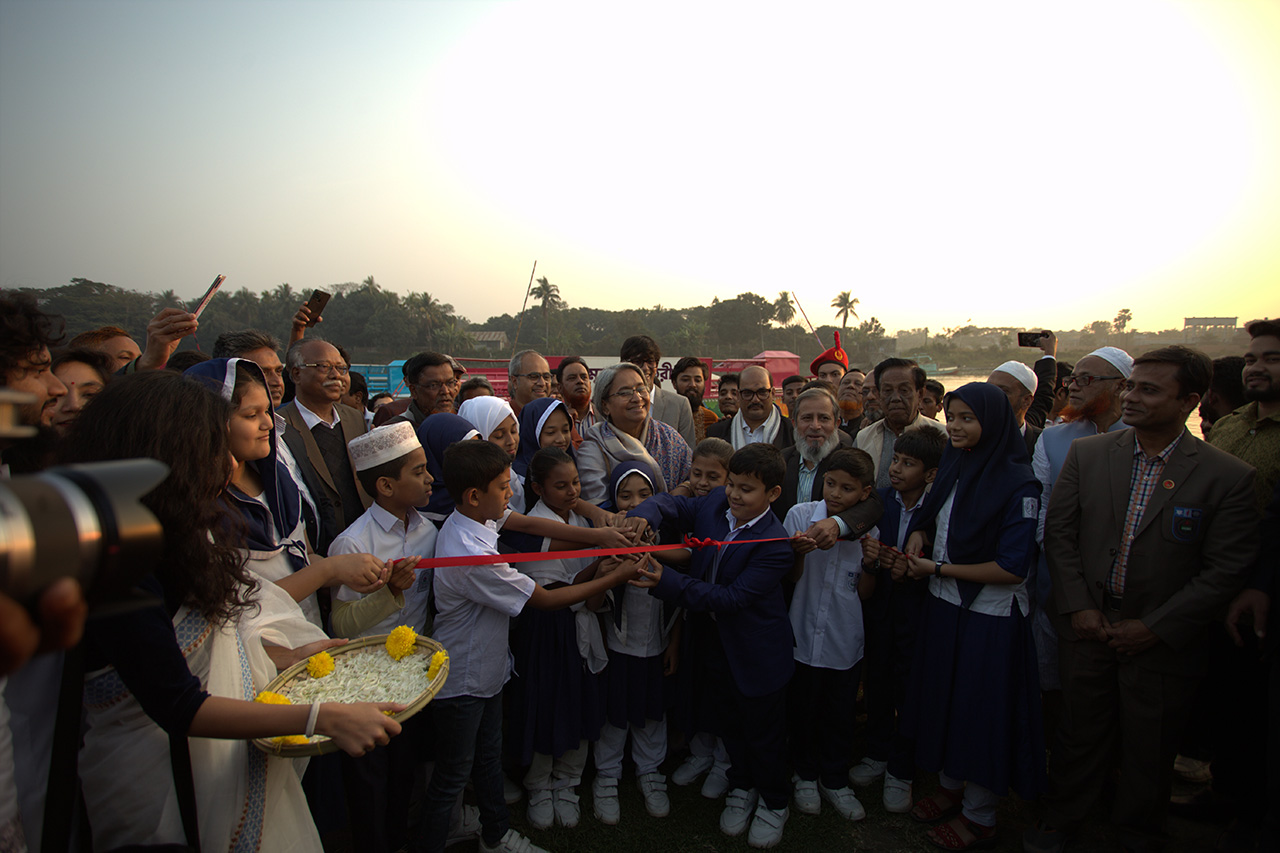
Children's play-based and experiential learning through floating boats now in Chandpur. Education Minister Dr. Dipu Moni inaugurated BRAC’s boat school on Friday, 27 January 2023 at Al-Amin Academy School and College in the city on the riverside.
At her speech as Chief Guest, Education Minister Dr. Dipu Moni said "Science and mathematics are very interesting subjects, they can be learned with great pleasure if we teach them with fun. If we don't, even the simplest subjects can become difficult. BRAC, on the occasion of its 50th anniversary, has transformed many boats into boat schools, using accessible materials such as pictures, animations, games to teach children of hard-to-reach areas science and mathematics. At the same time, children are learning the value of being humane, empathetic from the young age.
The basic philosophy of our new curriculum emphasises on the same. Children will not be afraid of examinations and will become persons with empathy and values. I believe our government's effort and BRAC's effort complement each other, which will take it further."
Safi Rahman Khan, Director, Education, Skills Development, and Migration, Profulla Chandra Barman, Programme Head, Education Programme along with BRAC head office and field staff were present at the programme.
Thematically designed around values, mathematics and science to celebrate the golden jubilee of BRAC, the three boats started their journey in September 2022 from the northeastern district of Sunamganj and will travel down to the coastal area of Bhola. The boats are making stopovers en route so that a wide range of children, students, teachers and people from the community can visit, and experience the travelling exhibits along with different activities. The duration of the stopovers are for 7-10 days, everyday from 10am-4pm. The boats draw volunteer teachers from the local communities to guide visitors. Special ramps have been designed for children with disabilities.
The educational activities and materials have been particularly designed for primary school children, although older students and visitors will also be able to experience the joy of learning. The visitors will be offered activities and contents on values, while maths and science subjects are designed with puzzles, hands-on experiments, problem solving with fun activities and games, and posters with short bios of great scientists and mathematicians.
The Values Boat was inspired by the philosophy of Sir Fazle Hasan Abed, founder of BRAC, who ensured that along with regular academic subjects, values education and performing fine arts were incorporated in BRAC schools.
All the boats are covered under CCTV surveillance and strictly follow BRAC’s safeguarding policies along with the health, safety and security guidelines.
BRAC introduced the concept of boat schools in the wetlands (haor regions) of north-eastern Bangladesh in 2011. The idea was to bring the classroom to the children who were disconnected from schools due to their homes being surrounded by water for most of the year. The Boat School project was selected as a “100 Global Inspiring Innovations of 2017” by HundrED, a Finnish global education non-profit organisation.
BRAC to organise ‘Hope Festival’ in celebration of the tenacity and bravery of the people of Bangladesh
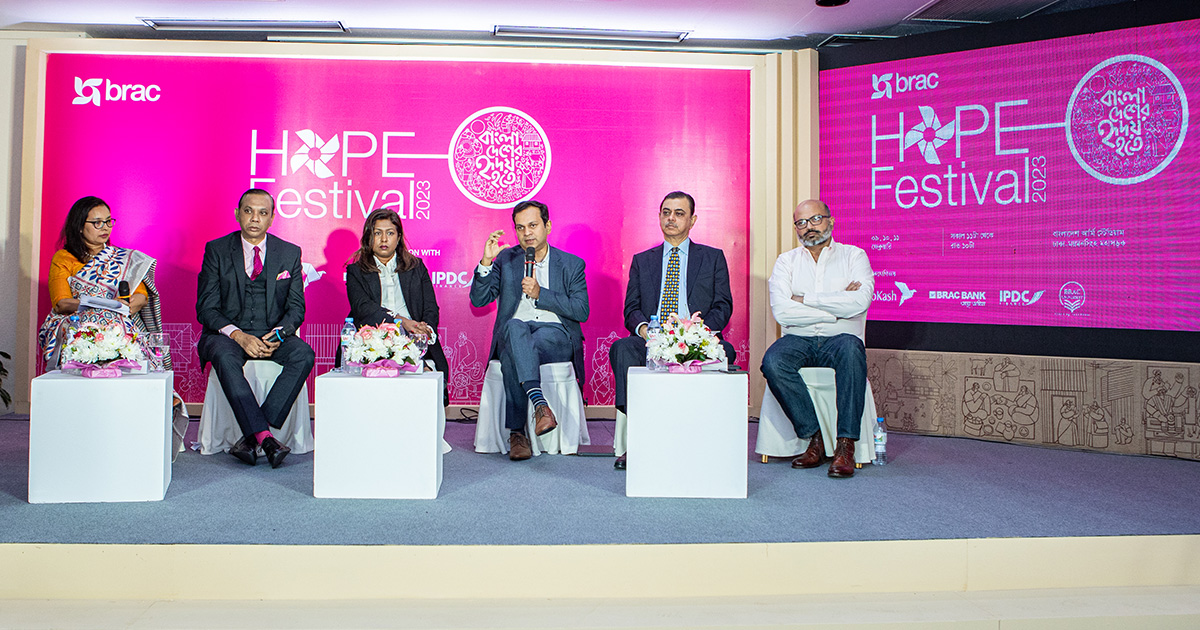
BRAC will organise a three-day long festival, of culture, stories, crafts, music and art, titled ‘Hope Festival’ as the epilogue of its year-long observances which marked 50 years of its founding. The announcement came at a press conference today at the Pan Pacific Sonargaon in the capital.
Venue: Bangladesh Army Stadium
Date: 9 to 11 February 2023
Time: Everyday 11 am to 10 pm
Hope Festival, an open-for-all event, will be held at Bangladesh Army Stadium in the capital on 9, 10 and 11 February, 2023. Everyone is welcome to take part in the festival by simply visiting the website brachopefestival.net and registering for the event.
Asif Saleh, Executive Director of BRAC Bangladesh and Tamara Hasan Abed, Managing Director of BRAC Enterprises made the announcement during the press conference.
Asif Saleh, Executive Director of BRAC Bangladesh said, “We believe that social change can’t be brought without partnerships. We have to come forward with new and innovative solutions to deal with these challenges. Building on the potential of the youth, we need to work together to meet the challenges of the future. Through this festival, we aim to get everyone onboard today to solve the social challenges of tomorrow.”
Tamara Hasan Abed, Managing Director of BRAC Enterprises said, “50 years of working with people, believing in their potential and organising the people to help them turn their lives around, this distinct approach to development, which BRAC stands for, is now being lauded the world over for its efficacy. We want to share insights we get from the ground with everyone. We want to inspire the vision of doing development differently and promote innovative approaches to tackle social problems.”
Selim R F Hussain, Managing Director and Chief Executive Officer of BRAC Bank Ltd Kamal Quadir, Chief Executive Officer of bkash and Mominul Islam, Managing Director and Chief Executive Officer of IPDC Finance Ltd were also present in the press conference.
BRAC’s founder Sir Fazle Hasan Abed used to say – when people have the opportunity to realise their potential, a light of hope gets switched on.
BRAC witnesses that belief turning into reality, every day, right from the frontline, to the last mile. Each of the over 100 million people BRAC works with – teachers, healthcare workers, entrepreneurs, artisans, farmers, producers, partners – from the heart of Bangladesh to the most remote corners of the world – is evidence of hope triumphing over adversity.
Hope Festival aims to inspire Bangladesh’s youth with those very stories of people turning their lives around, on their own, with just a tender rekindling of hope.
The three-day festival will cover three thematic areas with the first day (9 February) dedicated for a tribute to Bangladesh. On the second day (10 February), Hope Festival’s celebrations will be centred around showcasing the potential of people to transform their lives. Festivities of the final day (11 February) will lay out a vision for an equitable and prosperous future for all by sparking a discussion on the pathways to building the world we want.
Hope Festival aims to inspire conversations around five key focus areas, namely education, financial empowerment, gender equality, climate change and mental health.
To build a community of changemakers and find innovative ways of addressing these social issues, Hope Festival will provide a platform for everyone to submit their ideas to tackle these social challenges. People can submit their ideas online while registering for the festival and shortlisted ideators will get to share their ideas, connect and partner with other changemakers.
There will be open workshops with artisans, cartoonists, and urban greenscapers in the festival. People will get to stroll through a world of inspiration, experiencing bioscopes, puppet shows, human libraries, children’s play areas, and exhibits showcasing the power of hope. In a bid to inspire the youth to take ownership of solving social challenges, a group of young changemakers will be felicitated in the festival for their contributions through the ‘Amra Notun Network Young Changemakers Award’. Also, TAAGA Outstanding Young Professionals Award will be given out at the festival to women for their contributions at the workplace.
To ensure inclusion of persons with disabilities, Hope Festival will incorporate inclusive infrastructure in festival grounds. Moreover, visitors will get the opportunity to experience the life of persons with disabilities through interactive exhibits and a sign language performance. Everyday the festivities will be topped off with cultural performances in the evening by some of the biggest names from the cultural sphere of Bangladesh. Fazlur Rahman Babu, Nagar Baul (James), Arnob, Artcell, Lalon band and Nemesis will enthral the audience with their live performances. Bengal Parampara Sangeetalay will stage a special session.
Bkash, BRAC Bank, IPDC Finance and BRAC University are proud partners of the Hope Festival.
"Climate Adda" to raise awareness of environmental protection
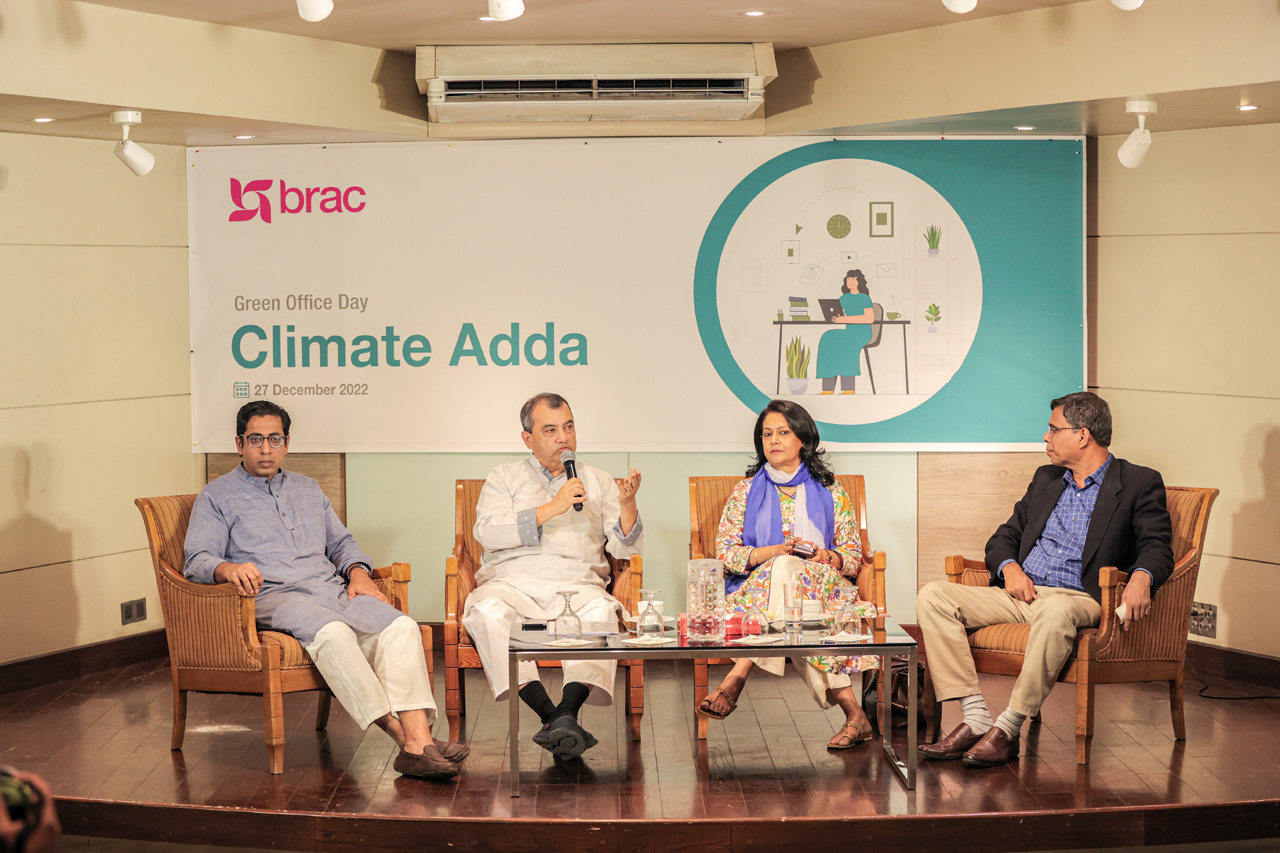
"Green Office Day" was celebrated at the BRAC Center of the capital on Tuesday, 27 December with the aim of reducing harmful carbon emissions and raising awareness of environmental protection. As part of this event, keeping in mind the theme of "Carbon Footprint Reduction" a "Climate Adda" was organised.
The organiser of the event says, the Adda was aiming to bring together in one discussion two essential ideas of “Moving towards a Carbon-Neutral World” and “Youth Engagement” as a pivotal stepping stone in taking our overall objective forward at BRAC which is to raise awareness on carbon footprint reduction and in contributing towards BRAC’s aim of becoming carbon-neutral in the near future.
“Climate Adda” mainly involves lively discussions to identify and acknowledge the problems at hand, which is the increasing carbon footprint leading to more global warming; how feasible and challenging are the solutions towards "Carbon-Neutrality"; and apart from this, how the steps can be taken to make a difference – were also discussed in detail.
Chairman of parliamentary standing committee on the Ministry of Environment, Forest and Climate Change Mr. Saber Hossain Chowdhury MP; Mr. Nahim Razzak MP; and Advocate Syeda Rizwana Hasan, Member, BRAC Governing Board and Executive Director, Bangladesh Environmental Lawyers Association (BELA) participated in the climate chat (Climate Adda). Dr. Md. Liakath Ali, Director of Climate Change Programme of BRAC and BRAC International moderated the discussion.
Mr. Saber Hossain Chowdhury said, “at this year's COP conference, we talked about an important gap. That is, lack of trust, faith. If developed countries do not keep their words, then we will not be able to move forward in any way towards the future. There is even no definition of what we mean by climate finance. Developed countries claim that they gave us $80 billion last year. However, according to the data of neutral organisations, it is not even $20 million.”
Mr. Nahim Razzaq says, “The carbon footprint is something we can all play a part in controlling. Be it in our home or outside home through behavioural changes. Unfortunately, we have yet to influence behavioural change. Especially those who are young need to be included in this process. National consensus and guidelines are needed.” He suggested adding climate change as a chapter in textbooks and curricula.
Advocate Syeda Rizwana Hasan said, “We have a lot to do from individual to social to state levels. We can emphasise on the use of public transport over the use of private transport. Then the role of the government should be to improve the public transport system. Bicycle lanes should be introduced to encourage the use of bicycles. Young people should come forward with proper leadership. To be able to be more climate-friendly we need to reduce consumption at personal and state levels. Youths have to raise questions on the safety of food and air.”
To sum up the discussion, Dr. Md. Liakath Ali said “BRAC has been at the forefront of reducing the organisation’s carbon footprint. One of the major initiatives successfully taken up in recent times has been the ban on single-use plastic within the organisation. In addition, we also discontinue the unnecessary use of items made of plastic including communication materials, encouraging paperless communication, and other climate-friendly energy resources, in an endeavour to save our forests — and, our planet.”
In the discussion, guest speakers talk about the global perspective on climate change, the role of the current government and the role of BRAC in this regard. How to engage our young generation, how they can play a more active role in the goal of building a carbon-free world, were discussed.
At the end of the discussion, members of the Popular Theatre, Social Empowerment and Legal Protection (SELP) Programme of BRAC performed Gombhira, a type of song originating in northwestern Bangladesh. BRAC officials, members of BRAC Youth Platform, and alumni of the Aamra Notun Network (ANN) under the BRAC Youth Platform participated in the programme.
“Build a world of play” campaign celebrates Play Labs
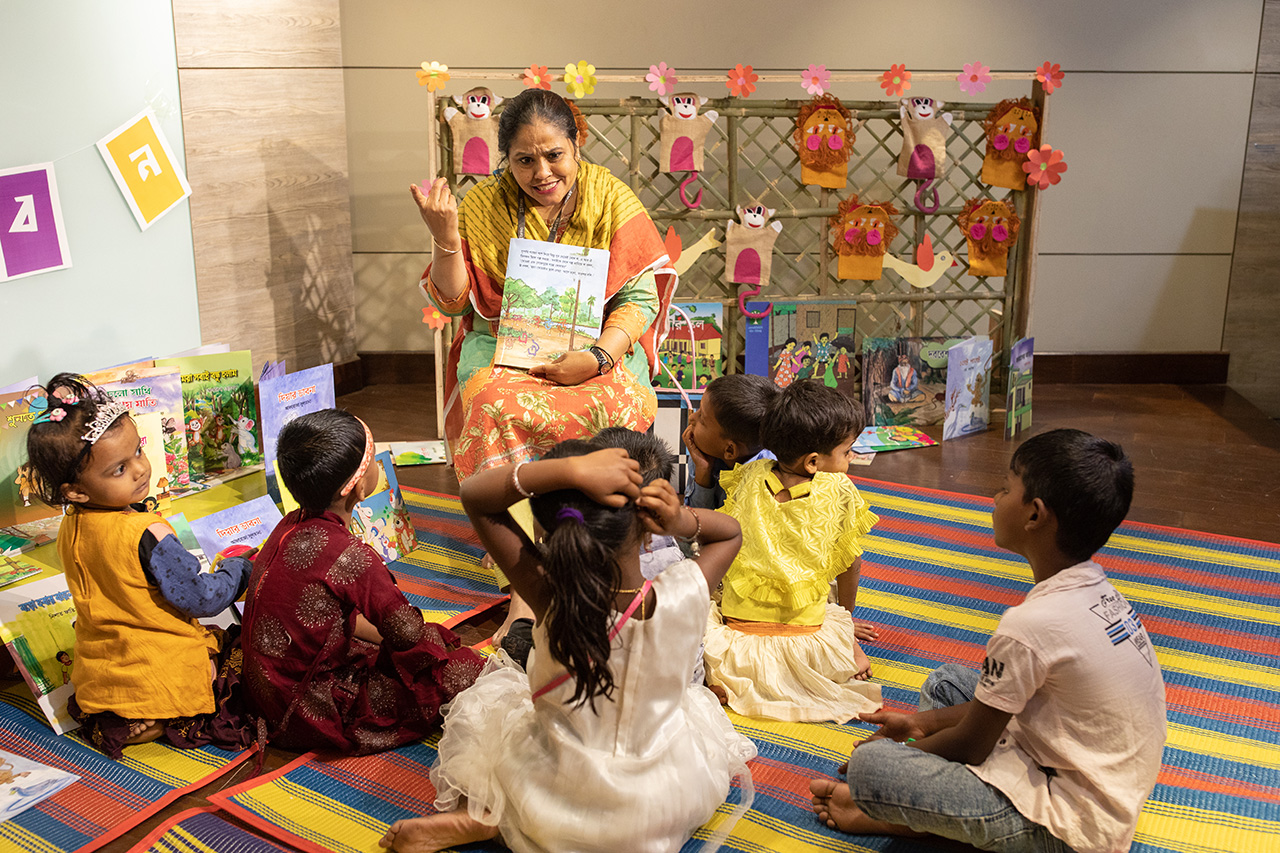
BRAC Centre at the capital’s Mohakhali went festive with children cheering and enjoying themselves doing a range of creative activities today on Wednesday, 7 December. They came with their parents and caregivers at a programme organised to celebrate the “BRAC Play Lab” model. BRAC Institute of Educational Development (BRAC IED), which developed this innovative model, organised the event as a part of celebrating 50th anniversary of BRAC, and 90th anniversary of LEGO Foundation – BRAC’s funding partner.
One of the largest development organisations of the world, BRAC, has established and supported its partners to establish play labs following the “BRAC Play Lab Model” so far in Bangladesh, Tanzania and Uganda. This model has been developed with funding from the Denmark-based child development organisation LEGO Foundation.
The children participated in diverse plays in the event, such as, making clay objects, drawing, learning through pictures, muppets, and word and number games. The event also showcased a research-based display of a range of traditional plays and games of Bengali and ethnic minority communities of Bangladesh.
The event was attended among others, by social media influencers of the country, cartoonists and artists Morshed Mishu, Syed Rashad Imam Tanmoy and Masuda Khan and magician Asif Asgar. They spent time with the children and participated in many activities.
Dr Erum Mariam, executive director, BRAC IED, and Kristine Morch, senior programme analyst, LEGO Foundation, were also present at the programme.
The Play Lab Model assists usually 1-5 years old children to learn through diverse play-based activities. The BRAC Play Lab model is particularly community-based, of high quality and cost-effective, so that joyful learning opportunities can be created for children with socioeconomically constrained situations. This model follows a play-based curriculum, for developing social-emotional learning, self-regulation, language, playfulness, creativity, empathy and problem-solving skills in children. The play labs are facilitated by “play leaders” who are local adolescent girls and young women and extensively trained in their facilitators’ role.
Apart from BRAC operated Play Labs, the organisation has provided technical assistance to the Bangladesh government to establish 400 Play Lab centres in 32 upazilas (sub-districts) of nine districts with over 25 thousand children participating. On the other hand, BRAC is running 656 play lab centres in Bangladesh, Tanzania and Uganda involving around 11,500 children.
BRAC has also developed an especially designed “humanitarian play lab” model for children in humanitarian emergency settings in conflict or post-conflict zones. This model is currently being implemented in the camps of Rohingya refugees in Cox’s Bazar district. BRAC is also operating such context and culture specific play labs in Uganda for children from refugee families taken shelter from neighbouring countries.
The humanitarian play lab model explores the therapeutic dimensions of play to foster resilience and healing process among the survivor children. The humanitarian play labs provide the Rohingya children with a space to play and express their emotions freely which, in turn, helps them feel safe. The design of these play labs reflect Rohingya culture and nurture children's spontaneity.
A global survey has found that 84% children want their parents to spend more time playing with them. Specialists observe that learning through play is a critical component in early childhood development and education. The BRAC Play Labs are built in a cost-effective process with locally available resources and reusable materials reflecting the local culture and language, and socio-economic and geographic contexts. Local community and parents are closely involved in the play lab centre operation.
The LEGO Foundation launched the #BuildaWorldofPlay campaign early this year on the occasion of its 90th founding anniversary. BRAC, as its partner, has joined the campaign, also as a part of its 50th anniversary celebration, in Bangladesh, Uganda and Tanzania focusing on the local context.
৮ম ব্র্যাক মাইগ্রেশন মিডিয়া অ্যাওয়ার্ড
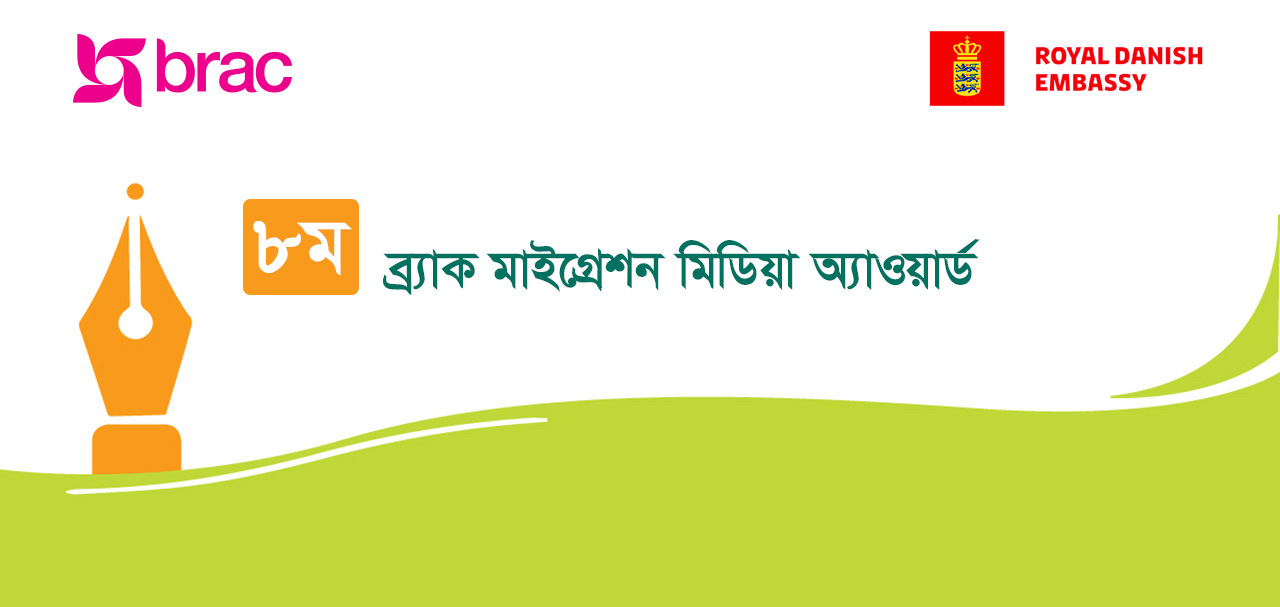
বাংলাদেশের উন্নয়ন এবং সমৃদ্ধির ক্ষেত্রে অভিবাসন খাতটি অত্যন্ত গুরুত্বপূর্ণ। জাতিসংঘের সর্বশেষ পরিসংখ্যান অনুযায়ী ২৭ দশমিক ২ কোটি মানুষ (বিশ্ব জনসংখ্যার ৩.৫%) কাজের জন্য বা অন্য কোনো প্রয়োজনে নিজ দেশে বাস না করে অন্য দেশে বাস করছেন এবং উভয় দেশেরই আর্থ-সামাজিক উন্নয়নে গুরুত্বপূর্ণ অবদান রেখে চলেছেন। বৈশিক শ্রম অভিবাসনে বাংলাদেশের অবস্থান ষষ্ঠ এবং প্রবাসী আয়ে সপ্তম।
বাংলাদেশকে আর্থিকভাবে সমৃদ্ধ করতে বৈদেশিক কর্মসংস্থান প্রবাসী আয় অত্যন্ত গুরুত্বপূর্ণ ভূমিকা পালন করলেও প্রয়োজনীয় তথ্যের অভাবে অভিবাসন প্রত্যাশীরা প্রায়শই প্রতারণার সম্মুখীন হচ্ছেন। বিশ্বের সর্ববৃহৎ বেসরকারি উন্নয়ন সংস্থা হিসেবে ব্র্যাক বাংলাদেশের অভিবাসনপ্রবণ জেলাগুলোতে নিরাপদ অভিবাসন নিশ্চিত, মানবপাচার প্রতিরোধ ও সচেতনতা সৃষ্টি এবং বিদেশফেরত অভিবাসীদের পুনরেকত্রীকরণের লক্ষ্যে কাজ করে যাচ্ছে। প্রতিবছর প্রবাস থেকে অনেক মানুষ দেশে ফেরত আসে। কিন্তু তাদের পুনরেকত্রীকরণের বিষয়টি একেবারে উপেক্ষিত থেকে যায়। বিষয়টির গুরুত্ব বিবেচনা করে ব্র্যাক ড্যানিশ দূতাবাসের সহায়তায় ‘সোশিও-ইকোনোমিক রিইন্টিগ্রেশন অব রিটার্নি মাইগ্রেন্ট ওয়ার্কার্স অব বাংলাদেশ- ফেইজ ২ (অনুপ্রেরণা)’ প্রকল্পটি বাস্তবায়ন করছে। এই প্রকল্পের অধীনে বিদেশফেরত অভিবাসীদের কাউন্সেলিং সেবা ও আর্থিক সহায়তাসহ বিভিন্নভাবে সহযোগিতা দেওয়া হচ্ছে।
দেশের উন্নতি ও সমৃদ্ধিতে গুরুত্বপূর্ণ অবদান রাখা অভিবাসী কর্মী ও তাদের পরিবারের অধিকার রক্ষায় গণমাধ্যমের ভূমিকা অনস্বীকার্য। অভিবাসনবিষয়ক সাংবাদিকতাকে আনুষ্ঠানিকভাবে স্বীকৃতি দিতে ব্র্যাক ২০১৫ সাল থেকে ‘ব্র্যাক মাইগ্রেশন মিডিয়া অ্যাওয়ার্ড’ প্রবর্তন করে। এরই ধারাবাহিকতায় অভিবাসন বিষয়ক সাংবাদিকতাকে অনুপ্রাণিত করতে অষ্টম বারের মতো ‘ব্র্যাক মাইগ্রেশন মিডিয়া অ্যাওয়ার্ড’ প্রদান করা হবে।
যেসব বিভাগে/ক্যাটাগরিতে ‘৮ম ব্র্যাক মাইগ্রেশন মিডিয়া অ্যাওয়ার্ড’ প্রদান করা হবে
(ক) সংবাদপত্র (জাতীয়): অভিবাসন বিষয়ে দেশে ও বিদেশে যে কোনো জাতীয় সংবাদপত্রে প্রকাশিত প্রতিবেদন।
(খ) সংবাদপত্র (আঞ্চলিক): অভিবাসন বিষয়ে বাংলাদেশের যে কোনো আঞ্চলিক সংবাদপত্রে প্রকাশিত প্রতিবেদন।
(গ) অনলাইন: অভিবাসন বিষয়ে দেশে ও বিদেশে যে কোনো অনলাইন পত্রিকায় প্রকাশিত প্রতিবেদন।
(ঘ) টেলিভিশন সংবাদ: অভিবাসন বিষয়ে দেশে ও বিদেশে যে কোনো টেলিভিশনে সম্প্রচারিত অনুসন্ধানী প্রতিবেদন।
(ঙ) রেডিও: অভিবাসন বিষয়ে দেশে ও বিদেশে যে কোনো রেডিওতে সম্প্রচারিত অনুষ্ঠান/প্রতিবেদন।
(চ) সোশ্যাল মিডিয়া: নিরাপদ অভিবাসন প্রতিষ্ঠায় ভূমিকা রাখা মানসম্মত ফেসবুক পেজ/ব্যক্তিগত আইডি/ব্লগ বা ইউটিউব চ্যানেল।
(ছ) গনমাধ্যম প্রতিষ্ঠান: অভিবাসন বিষয়ে বছরব্যাপি ভূমিকা রাখা প্রিন্ট/অনলাইন/টেলিভিশন/রেডিও।
প্রতিবেদন/অনুষ্ঠান/সোশ্যাল মিডিয়া কনটেন্টসমূহ প্রকাশ বা প্রচারের সময়সীমা
দেশে অথবা প্রবাসে অবস্থানরত যেকোনো বাংলাদেশি সাংবাদিক ও গণমাধ্যম ব্যক্তিত্ব আবেদন করতে পারবেন। এছাড়া সোশ্যাল মিডিয়া ক্যাটাগরিতে যেকোনো বাংলাদেশি ব্যক্তি আবেদন করতে পারবেন। অভিবাসনবিষয়ক প্রতিবেদন/অনুষ্ঠান/সোশ্যাল মিডিয়া কনটেন্টসমুহ অবশ্যই ১ জানুয়ারি ২০২২ থেকে ৩১ ডিসেম্বর ২০২২ এর মধ্যে প্রকাশিত/প্রচারিত হতে হবে।
প্রতিবেদন জমা দেওয়ার নিয়ম:
সিরিজ রিপোর্ট ছাড়া কোনো প্রতিযোগী একই ক্যাটাগরিতে একের অধিক প্রতিবেদন জমা দিতে পারবেন না। সিরিজ রিপোর্টের ক্ষেত্রে পর্ব সংখ্যা এবং প্রকাশিত/প্রচারিত হওয়ার তারিখ উল্লেখপূর্বক সিরিজের সবগুলো প্রতিবেদন জমা দেওয়া যাবে।
যোগ্যতা ও সতর্কতা
মিডিয়া অ্যাওয়ার্ডের জন্য জমা দেওয়া প্রতিবেদন/অনুষ্ঠানসমূহের স্বত্বাধিকার নিশ্চিত করতে হবে। সংবাদপত্রে প্রকাশিত প্রতিবেদনসমূহের অনলাইন লিংক এবং টেলিভিশনে প্রচারিত প্রতিবেদন/অনুষ্ঠানের ইউটিউব লিংক (যদি থাকে) প্রতিবেদনের সঙ্গে জমা দিতে হবে। যদি অনলাইন লিংক বা ইউটিউব লিংক না থাকে সেক্ষেত্রে সংশ্লিষ্ট গণমাধ্যমের সম্পাদক/বার্তা সম্পাদক কর্তৃক নির্ধারিত সময়ের মধ্যে (১ জানুয়ারি ২০২২ থেকে ৩১ ডিসেম্বর, ২০২২) সংবাদ/অনুষ্ঠানটি প্রচারিত হয়েছে মর্মে (প্রকাশ/প্রচারের তারিখ উল্লেখসহ) সত্যায়নপত্র সংযুক্ত করতে হবে। সোশ্যাল মিডিয়ার ক্ষেত্রেও কন্টেন্টগুলো উল্লেখিত সময়ের মধ্যে প্রকাশিত/প্রচারিত হতে হবে। অসম্পূর্ণ/ভুল তথ্যসংবলিত আবেদন বাতিল বলে গণ্য হবে।
আবেদন করার শর্ত
১. অভিবাসন খাত, অভিবাসী ও শরণার্থী কিংবা তাদের পরিবারের অধিকার রক্ষায় গুরুত্বপূর্ণ ভূমিকা রাখে এমন প্রতিবেদন/অনুষ্ঠান/সোশ্যাল মিডিয়া কনটেন্ট (প্রকাশিত বা সম্প্রচারিত) হতে হবে।
২. সংবাদ প্রতিবেদন বা অনুষ্ঠানের ক্ষেত্রে দেশে বা প্রবাসে অবস্থানরত শুধু বাংলাদেশি সাংবাদিকরাই এই অ্যাওয়ার্ডের জন্য আবেদন করতে পারবেন।
৩. সোশ্যাল মিডিয়া কন্টেন্টের ক্ষেত্রে যে কোনো বাংলাদেশি ব্যক্তি আবেদন করতে পারবেন।
৪. আবেদনকারীকে অবশ্যই তাঁর জীবনবৃত্তান্ত যথাযথ ফরমেটের মাধ্যমে (ফরমেটগুলো সর্বশেষ পাতায় সংযুক্ত) পাঠাতে হবে। প্রয়োজনীয় নথি হিসেবে প্রতিবেদন যে মাধ্যমে প্রকাশিত হয়েছে তার বিবরণ জমা দিতে হবে।
৫. আবেদনকারী তাঁর কর্মজীবন সম্পর্কে অর্ধেক পাতার মধ্যে সংক্ষিপ্ত বিবরণ (বাংলা ও ইংরেজি ভাষায়) সংযুক্ত করে পাঠাবেন। সংযুক্ত ফরমেটটি পূরণ করে আবেদনপত্রের সঙ্গে পাঠাতে হবে।
৬. প্রিন্ট মিডিয়ার প্রতিবেদনের ক্ষেত্রে (জাতীয় ও স্থানীয় উভয় ক্ষেত্রে) সংবাদপত্রে প্রকাশিত মূল কপিটি প্রেরণ করতে হবে। সংবাদপত্রের এবং প্রতিবেদকের নাম ও তারিখ অবশ্যই দৃশ্যমান হতে হবে। সংযুক্তি হিসেবে প্রকাশিত কপি ছাড়াও সিডির মাধ্যমে সংবাদটির ওয়েব লিংক এবং সফটকপি জমা দিতে হবে।
৭. বেতারের ক্ষেত্রে এএম, এফএম এবং পডকাস্ট বেতারতরঙ্গে সম্প্রচারিত অনুষ্ঠান অথবা প্রতিবেদন হতে হবে। এর সঙ্গে সংক্ষিপ্ত/সম্পূর্ণ স্ক্রিপ্ট যদি বর্তমান থাকে তবে জমা দিতে হবে। নিয়মিত বেতারে সম্প্রচারিত অনুষ্ঠানের অন্তত পরপর তিনটি অনুষ্ঠানের কপি জমা দিতে হবে।
৮. টেলিভিশনের ক্ষেত্রে অবশ্যই সম্পূর্ণ স্ক্রিপ্ট সহকারে প্রতিবেদনটি সিডি/ডিভিডির মাধ্যমে জমা দিতে হবে।
৯. অনলাইন মিডিয়ার ক্ষেত্রে প্রতিবেদনটি ওয়েবসাইটে প্রকাশিত হতে হবে এবং অনলাইনে যেভাবে প্রচারিত হয়েছে সেভাবে সংশ্লিষ্ট প্রতিবেদনটি স্ক্রিনশটসহ জমা দিতে হবে। এছাড়াও ইউআরএলসহ সফটকপি সিডিতে জমা দিতে হবে।
১০. সোশ্যাল মিডিয়ার ক্ষেত্রে ফেসবুক পেজ/ব্যক্তিগত আইডি অথবা ইউটিউব চ্যানেলে প্রকাশিত অভিবাসন বিষয়ক অন্তত দশটি কন্টেন্টের লিংক এবং সোশ্যাল মিডিয়ায় যেভাবে প্রকাশিত হয়েছে সেভাবে স্ক্রিনশট দিয়ে পাঠাতে হবে। (২০২২ সালের ৩১ ডিসেম্বরের পর কন্টেন্টের কোন ধরনের সম্পাদনা গ্রহনযোগ্য হবে না)।
বিচারকমন্ডলী
যেসব প্রতিষ্ঠান বা সংস্থার সম্মানিত বিচারকমন্ডলীর দ্বারা আবেদনকৃত প্রবন্ধ/অনুসন্ধানী প্রতিবেদন মূল্যায়ন করা হবে:
১. প্রবাসী কল্যাণ ও বৈদেশিক কর্মসংস্থান মন্ত্রণালয়ের একজন প্রতিনিধি।
২. গণযোগাযোগ ও সাংবাদিকতা বিভাগের একজন শিক্ষক।
৩. আন্তর্জাতিক সংস্থার একজন প্রতিনিধি।
৪. একজন সিনিয়র সাংবাদিক/গণমাধ্যম ব্যক্তিত্ব।
আবেদনের শেষ তারিখ
২০২৩ সালরে ০৯ই জানুয়ারীর বিকেল ৫টার মধ্যে আবেদনটি ‘৮ম ব্র্যাক মাইগ্রেশন মিডিয়া অ্যাওয়ার্ড’ আয়োজক কমিটি ঠিকানায় পৌঁছাতে হবে। নির্ধারিত সময়সীমার পরে কোনো আবেদন গ্রহণযোগ্য হবে না। আবেদন সরাসরি বা ডাকযোগে জমা দিতে হবে। তবে প্রবাসে অবস্থানকারী সাংবাদিকেরা ইমেইলের মাধ্যমেও প্রতিবেদন জমা দিতে পারবেন।
আবেদন জমাদানের ঠিকানা:
‘৮ম ব্র্যাক মাইগ্রেশন মিডিয়া অ্যাওয়ার্ড’
মাইগ্রেশন প্রোগ্রাম, ব্র্যাক
ব্র্যাক সেন্টার, ৭৫ মহাখালী (১২ তলা)
ঢাকা-১২১২
বাংলাদেশ
ইমেইল: This email address is being protected from spambots. You need JavaScript enabled to view it.
প্রয়োজনে যোগাযোগ: ফোন: ৮৮০২ ২২২২৮১২৬৫ এক্সটেনশন: ৩৯১৩
পুরস্কার বিতরণী অনুষ্ঠান
‘৮ম ব্র্যাক মাইগ্রেশন মিডিয়া অ্যাওয়ার্ড’ এর পুরস্কার বিতরণী অনুষ্ঠানের তারিখ সংশ্লিষ্টদের যথাসময়ে জানানো হবে।
Policy dialogue held on Rohingya crisis response
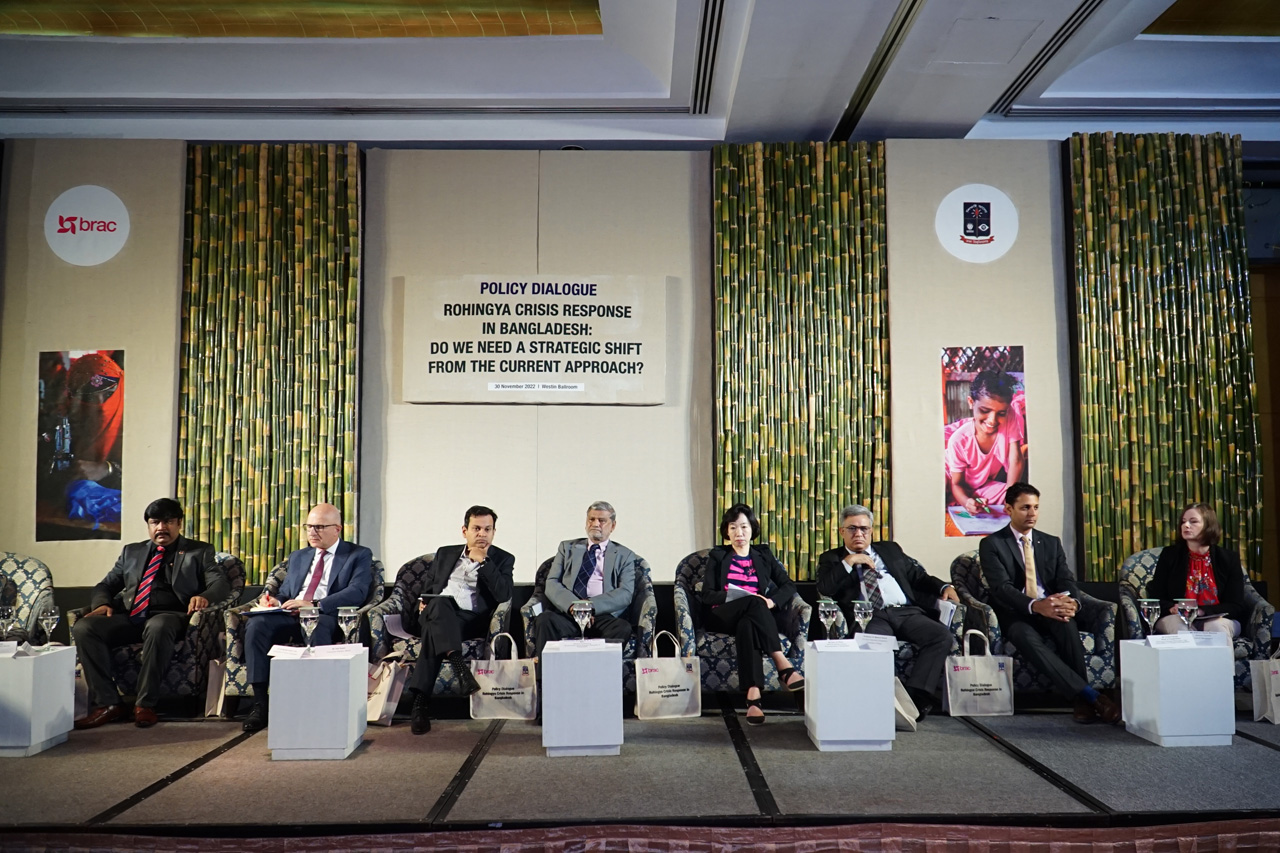
‘Time to opt for skill development approach to meet emerging needs of Rohingyas’
Since five years have elapsed, repatriation is still hanging in limbo, and the flow of funds is more fragile than before, it is time to focus on making a strategic shift towards skills development approach for the Rohingyas sheltered in the camps.
Speakers at a policy dialogue titled: “Rohingya Crisis Response in Bangladesh: Do we need a strategic shift from the current approach?” came up with the observations on 30 November 2022. BRAC and the Department of Development Studies, University of Dhaka jointly organised the dialogue at a local hotel.
Since the beginning of the Rohingya influx in 2017, the responding agencies have prioritised providing lifesaving assistance to the Forcibly Displaced Myanmar Nationals (FDMNs).
Several other issues such as the Russia-Ukraine war, humanitarian crisis in Afghanistan, and the ongoing global economic crisis appeared as bigger global concerns in the meantime. The prolonged nature of the crisis also tightened the flow of humanitarian assistance from donors and international agencies.
Four idea papers developed by the Department of Development Studies, University of Dhaka were presented at the dialogue that explored the changing needs of the refugees, potential livelihood mediums for them in 2023 and beyond, and roles of local, national and international NGOs in addressing these issues as well as map new sources of finance.
Citing the papers, speakers stressed on paying attention to the needs of the host communities. Addressing their insecurities would strengthen the host-Rohingya relationship; thus paving the way for determining strategic response, they said.
Honourable Planning Minister Mr. M A Mannan MP graced the opening session as the chief guest. He said, “Unfortunately, we have no direct control over the Myanmar issue. The Government of Bangladesh did whatever was possible on its part. However, Myanmar’s position is still unclear. With help from NGOs, development partners, and UN agencies, we have been able to reach a point to meet the basic requirements of the Rohingyas but it is not enough. We need to reach a consensus with our neighbours and the international community. The government will continue its attempts to repatriate the Rohingyas.”
Ms So-Jin Rhee, UNHCR interim Country Representative in Bangladesh, said, “The solution lies in Myanmar. But in the meantime, we have to bridge the gap. We are in a protracted situation. As a UN agency, we have to look at this strategically. Going into sixth year, funding is dwindling. At this juncture, we need to look into how to ensure the minimum like protection, health, WASH, food. We need to invest in resilience, education, skills development so that the Rohingya refugees become productive members of society.”
H.E. Mr Mustafa Osman Turan, Ambassador of Turkey to Bangladesh, said, “Turkey is best placed to understand the situation in Bangladesh as we are hosting the highest numbers of refugees in the world, which is nearly 4 million. We really appreciate the compassion and generosity that was shown by Bangladesh when the Rohingyas had to flee several times and significantly in 2017. We stood by Bangladesh and have been providing support in many different ways including a field hospital, which is treating 1,500 patients every day, free of charge. I would like to congratulate BRAC and Dhaka University for digging deeper into this very complex problem. I am looking forward to the outcomes. Turkey will continue to support Bangladesh until Rohingyas are repatriated.”
Asif Saleh, Executive Director of BRAC, said: “We should now look for a mid-term strategy for the refugees as we continuously advocate for their safe and dignified return to their homeland. There is a growing consensus within the sector that the current work needs to shift towards a development-like approach from a very short-term humanitarian crisis-focused approach. The only solution for the Rohingya refugees is their sustainable and voluntary repatriation to Myanmar.”
Ms Kathryn Davis Stevens, Mission Director, USAID Bangladesh, said, “We need to focus on market based solutions so that the Rohigyas can return to a prosperous future in Myanmar. At the same time, we must educate and ensure essentials for the host communities; going beyond the humanitarian response. Today I would like to stress on livelihoods, educational opportunities, security, stable economic opportunities to guard against dehumanisation of Rohingyas. Our total assistance in response to the Rohingya refugee crisis reached nearly $1.9 billion since August 2017. USAID will continue to provide support to the Rohingya crisis.”
Vivek Prakash, Head of Cooperation, Rohingya Refugee Response, High Commission of Canada to Bangladesh, said, "Canada has been the development partner of Bangladesh since its independence. The Rohingya crisis has moved past the emergency response to a more protracted nature. We are also continuing to mount pressure on the government of Myanmar. Canada continues to provide essential services to the Rohigya community; a key support is LPG gas that is helping in protecting the environment. It is important to maintain social cohesion among the Rohingyas and host communities so that the host community does not feel left behind. But it’s important not to forget this is a humanitarian crisis and in Bangladesh, the Rohingyas have limited opportunity to work so the financial implication is high.
In his concluding remarks the Chair of the Session Dr Imtiaz Ahmed, Professor of International Relations, University of Dhaka said, “To make it all inclusive it would have been better if the research considered voices of the Rohingya population as well.”
It may be mentioned, the government of Bangladesh has been striving to expedite the repatriation of about 1.2 million Rohingyas sheltered in Cox's Bazar and Bhasan Char. However, no significant response is yet perceptible from the Myanmar side.
“Invest, young people will take care of the rest”
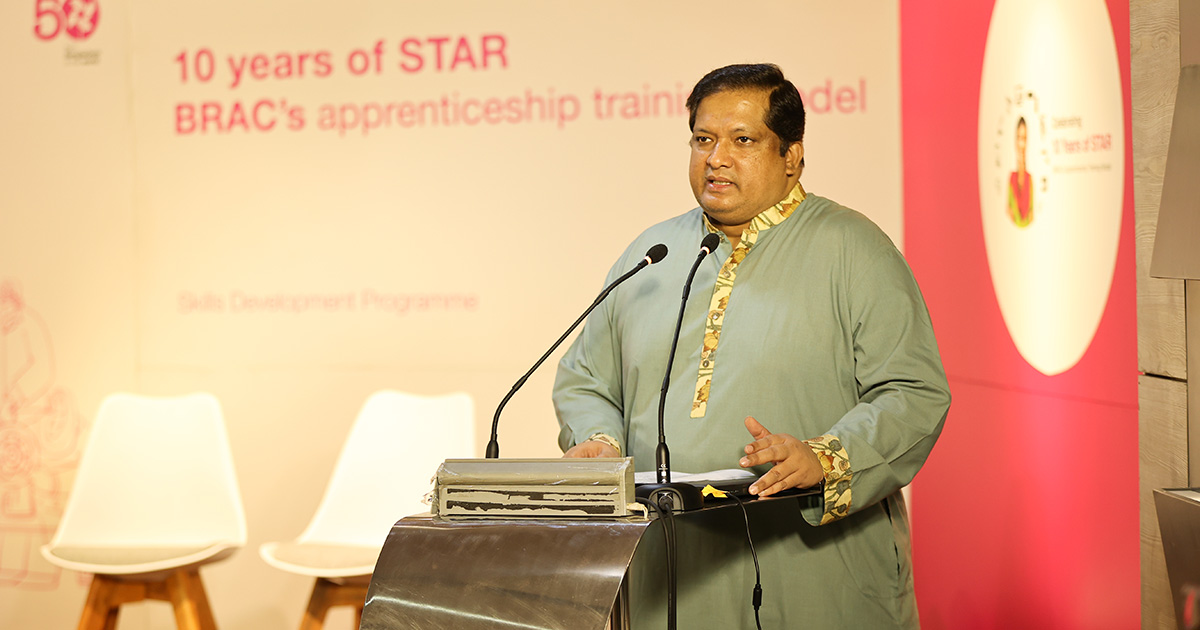
“Invest, young people will take care of the rest”, said State Minister for Youth and Sports Zahid Hasan Russell, MP while emphasizing the necessity for hands on-the-job training in Bangladesh. He was addressing as the Chief Guest at the celebration of 10 years of STAR (BRAC’s Skills Trainings for Advancing Resources) project held at BRAC Centre, Dhaka.
“Bangladesh Government is investing in skills development of youth and taking different initiatives. Government and non-profits. Government and NGOs can work hands on hands to reach out to youth who are in needs of education or technical training”, he added.

The on-the-job training programme is a solution to unemployment and poverty for the out of school adolescent and youth, said Asif Saleh, Executive Director of BRAC.
He noted that this programme is even more effective in terms of creating employment for the female participants. 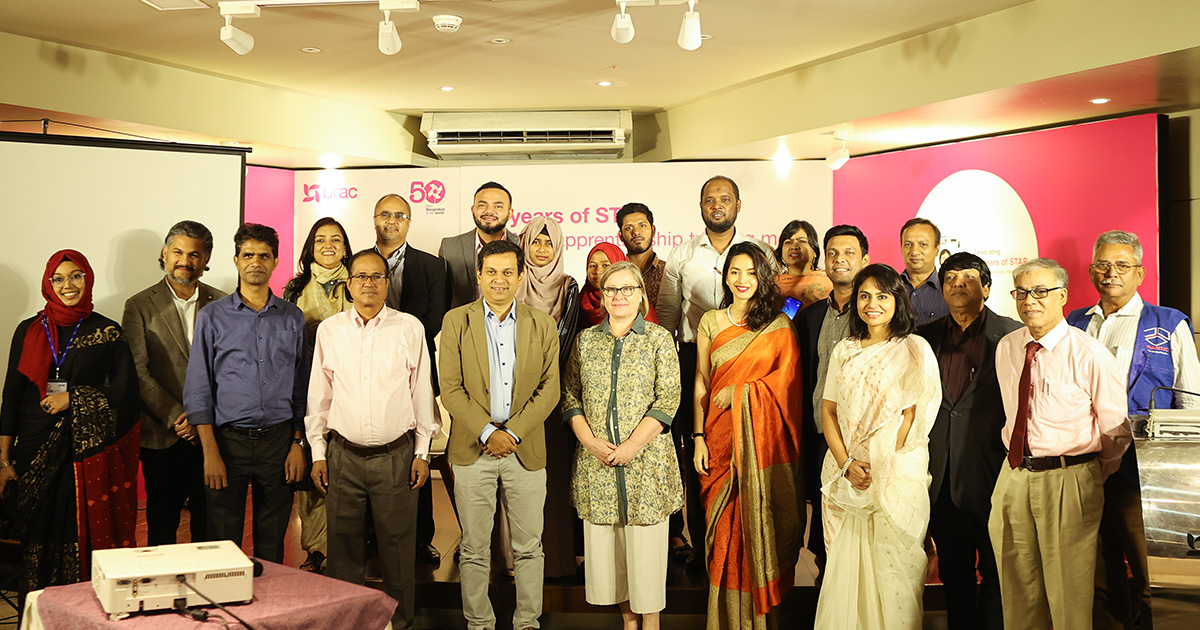
Also present as special guests were, Md Nuruzzaman Sharif, ndc, Director General and Joint Secretary, Bureau of Non-formal Education (BNFE), Dr Md Omar Faruque, Director General and Additional Secretary, Directorate of Technical Education, Dr Md Alfaz Hossain, Project Director, Comprehensive Village Development Program (CVDP).
The training has more positive impacts on girls than boys: Effect on girls’ savings was 6 times higher than that of boys, employment among unmarried women increased by 43%, reduced chances of early marriage by 62% amongst female participants and subsequently delayed early childbirth.
In 2012, BRAC, UNICEF, ILO and Bureau of Non-Formal Education (BNFE) launched the Skills Training for Advancing Resources (STAR) as part of the Basic Education for Hard-to-Reach Urban Working Children (BEHTRUWC) project. The training builds on the traditional “Ustad-Shagred” (Master-Apprentice) model, where out of school adolescent and youth are placed as apprentices with local businesspersons known as Master Craft Persons. Over the years, STAR has demonstrated its success in providing an alternative learning pathway by training over 120,000 young people, especially in reaching around 60% girls who had no other learning options.
As the training is aligned with market-driven skills needs and the National Technical and Vocational Qualification Framework (NTVQF), graduate apprentices can go on to acquire Recognition of Prior Learning (RPL) certification, and eventually better-paid jobs, in the formal sector as well. STAR has also been recognized as one of the top 10 global solutions for youth by the Generation Unlimited.
Using environment-friendly materials: BRAC policy implementation stepped up
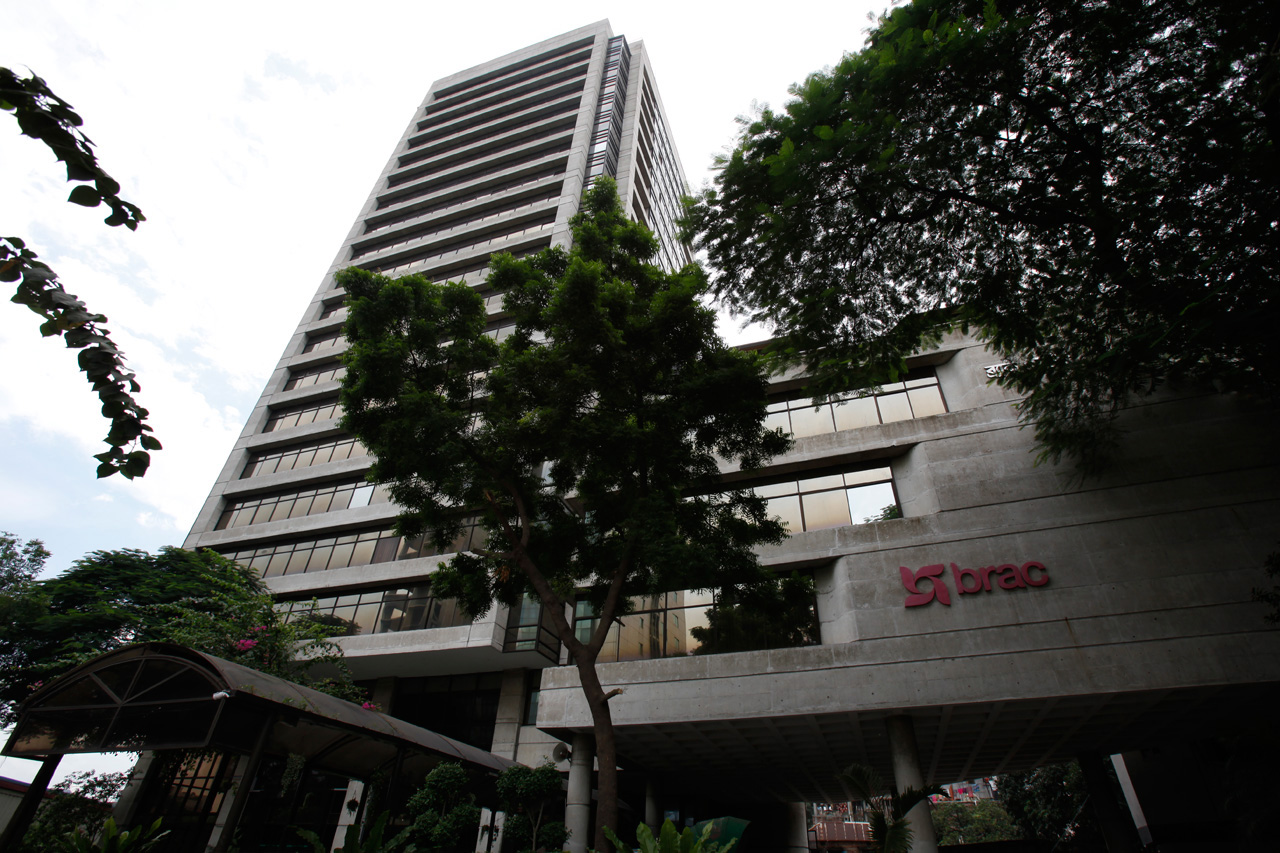
BRAC has stepped up the implementation of its policy to use environment-friendly materials. The organisation now stops using PVC banners and all other one-time campaign materials made of plastics as part of its environ-friendly policy.
A memo signed by Asif Saleh, executive director, BRAC Bangladesh, was circulated internally for all its staff. The policy will be in effect from tomorrow Monday, 1 November 2022.
This initiative is a part of the organisation’s effort to curb its carbon footprint through environment-friendly measures. BRAC has formulated its strategy and infrastructural targets to reduce carbon emission across all its offices. The measures in this regard include - stop using of all one-time campaign materials such as one-time PVC banners and replacing those with cloth and other environment-friendly materials. The initiative also includes stop using of one-time plastic bottles, bags, spoons, straws and other materials/utensils in all events of BRAC, and ensure use of environment-friendly materials as much as possible for all organisational purposes.
A close monitoring system has also been put in place to ensure rigorous policy and strategy implementation.
BRAC’s first initiative in this regard was brought into effect on 1 November 2019, under which use of one-time plastic bottles was forbidden at all BRAC offices.
Frugal Innovation Forum 2022: Platform for practitioners to explore frugal innovations in the Global South
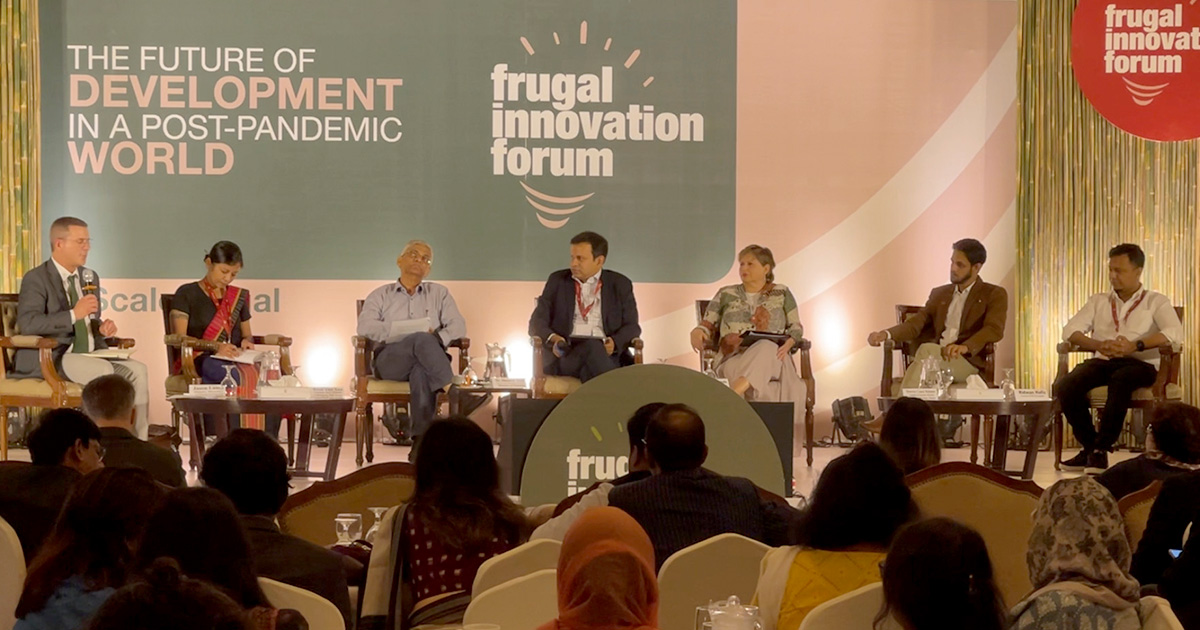
The post-pandemic world will see a robust rebuilding if the governments, non-governmental and private actors, innovators, social and mass media and community join hands in well-coordinated efforts to address the inequalities pervasive throughout the communities across the world and that aggravated during Covid-19.
These views came at a 2-day (12-13 October) conference titled “Frugal Innovations Forum” (FIF) hosted by BRAC. With 200 participants and over 40 speakers from the Global South countries, FIF 2022 comprised one daylong field visit and two days of panel discussions, presentations and workshops.
BRAC, one of the largest development organisations in the world, is hosting the Frugal Innovation Forum for the last seven years to facilitate the exchange between the social innovators around the world, especially those from the Global South, and other actors. This year, the FIF’s focused theme “The Future of Development in a Post-Pandemic World” highlighted the topics ranging from financial inclusion and education to healthcare and beyond.
Dr Shamsul Aam, state minister, Ministry of Planning; Dr Lilly Nicholls, high commissioner of Canada to Bangladesh; Anir Choudhury, policy advisor, Government of Bangladesh/UNDP; Rani Yan Yan, Chakma Rani (Queen), Chittagong Hill Tracts; Kamal Quadir, chief executive officer, bKash; Hillary Miller-Wise, deputy director, Global Growth and Strategy, Bill and Melinda Gates Foundation; Zaved Akhtar, CEO, Unilever Bangladesh Limited; Yasir Azman, CEO, Grameenphone Ltd.; and Md Mahbub ur Rahman, CEO, HSBC Bangladesh; were among the distinguished guests at the different sessions of the 2-day event. Members of the senior management from BRAC also addressed the audience at the event.
State minister for planning Dr Shamsul Aam in his speech today (closing day) focused on the government’s proactive actions to mitigate the impacts of climate change in Bangladesh. He said, “we are increasingly prioritising actions to build our resilience, while we are at work in finding nature-based solutions to address the adverse situations triggered by climate change.”
Speaking on how the lessons learned during the pandemic can be utilised in the post-pandemic time, Anir Choudhury policy advisor of Government of Bangladesh/UNDP said, “we have three takeaways from the pandemic, which are:
- data collaboration is possible between government, telcos, NGOs, private sectors, which enabled unprecedented response
- distributed delivery models through remote diagnosis, wearable technology, community health workers are key in delivering health care to the community
- WhatsApp bureaucracy is real that made major decisions possible without letters, meetings, Zoom calls just by discussing and deciding in real time on a chat forum”
Eminent economist and chairperson of BRAC Bangladesh Dr Hossain Zillur Rahman emphasised that solutions to the challenges in the Global South should be ground-up, gender intentional and based on people’s lived experiences, which is the key takeaway of the 2-day Frugal Innovation Forum. “To make meta-transformations, the world of policy and non-state actors cannot speak in different languages,” he further added.
Speaking on the closing day, Asif Saleh, executive director, BRAC, highlighted BRAC’s future role in the new normal era. “BRAC will continue to stay relevant. With the changing nature of society and country, different types of problems will be emerging. We look at ourselves as part of the solution ecosystem with the government, private sector, development partners and social entrepreneurs. BRAC will be doing exactly what it has been doing. We are working side-by-side with the governments, private sectors and change-makers both nationally and globally. Because beautiful things can happen when all of us work together.”
Int’l Girl Child Day dialogue on youth attitude towards gender norms
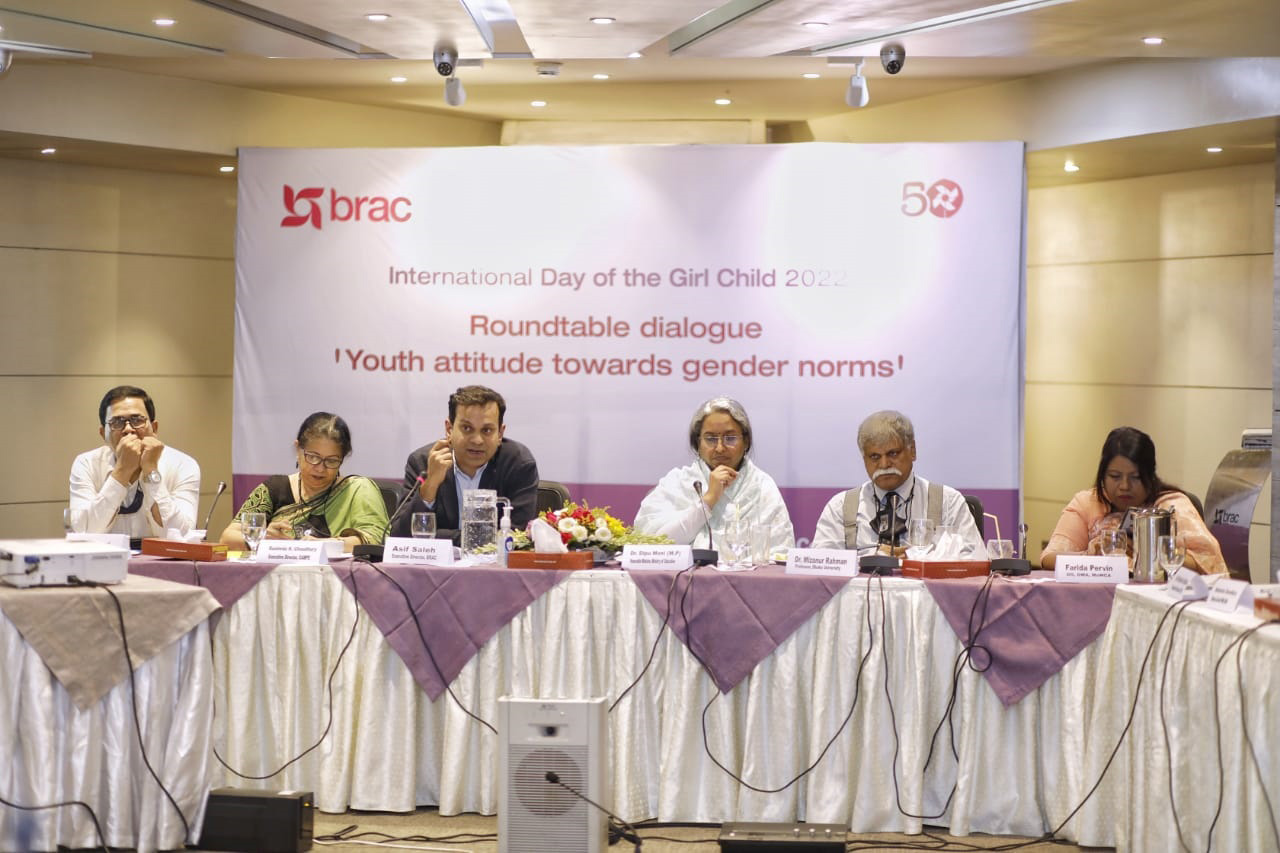
Experts, activists call for stronger collaboration to transform gender stereotypes
“We have a force in our country that is vehemently against gender equality. In Bangladesh, women have indeed achieved much progress, but they will still have to go a long way. But their journey is fraught with many hurdles. They will have to reach that state where they will claim their right to make decisions about their own life. It’s the family who has to stand beside their women and children in their fight to progress in life, but in our society our families are ridden with patriarchal values. We have to relentlessly work to transform this value system,” said Dr. Dipu Moni, minister for education and lawmaker, at a roundtable discussion today, Monday, 10 October 2022 organised at BRAC Centre in the capital.
BRAC organised the event on the occasion of International Girl Child Day to be observed tomorrow. The education minister was present at the event titled “International Girl Child Day dialogue on ‘Youth attitude towards gender norms’” as the chief guest. Asif Saleh, executive director, BRAC, chaired the programme.
The youths of Bangladesh, popularly termed as ‘population dividend’, currently make up more than half the population of the country and as such are the prime actors, sometimes prime victims also, in terms of the country’s scenario of gender equity and gender-based violence.
Recognising this crucial role of the youth, BRAC conducted a study on the youth perception towards gender norms in Bangladesh and shared the findings of the study at an event.
Special guests were Rasheda K. Choudhury, former adviser to Caretaker Government and present executive director, Campaign for Popular Education (CAMPE); Farida Pervin, director general, Department of Women Affairs, Ministry of Women and Child Affairs; Professor Nehal Ahmed, director general, Directorate of Secondary and Higher Education, Ministry of Education; Professor Dr. Mahjabeen Haque, Department of Educational and Counselling Psychology, Dhaka University; Professor Dr. Mizanur Rahman, former chairman of Bangladesh Human Rights Commission and at present teaching at Dhaka University; Dr. Fahmida Khatun, executive director, Center for Policy Dialogue (CPD); Syeda Rizwana Hasan, executive director, Bangladesh Environment Lawyers’ Association (BELA); and Korvi Raksand, founder, Jaago Foundation. KAM Morshed, senior director, Advocacy, Innovation & MEAL, BRAC, also spoke at the event. Nobonita Chowdhury, director, Gender Justice and Diversity, and Preventing Violence against Women Initiative, BRAC, moderated the dialogue.
Professor Dr. Mahjabeen Haque, Dr. Mohammad Salim Chowdhury and Dr. Md Azharul Islam jointly conducted the study titled “Exploring attitude towards gender norms among the youth population in Bangladesh”, the findings of which were shared at the dialogue by Dr. Mahjabeen Haque. The study was conducted among 2,790 men and women of age group 18-35 years, with around 50% male-female participant ratio, from altogether eight districts covering eight divisions.
Overall, the findings reflected a deeply rooted psyche favouring male control and male supremacy among the participants. Some of these responses are:
- 75% believe a wife needs not earn if her husband earns enough to run the household;
- 82% believe girls should not speak loudly;
- 73% think the male has the final say for large family expenses;
- 62% believe that it’s the girl’s family that should have the final say whether she should have higher education or not;
- Participants who went to Madrasa showed less sensitivity to gender-equal lens than those who went to Bengali medium institutions.
CAMPE director Rasheda K Chowdhury said, “Bringing overnight change in the youth psyche is not possible. It will take time. Also we have to bring changes in the education curriculum to reflect the national achievement of our women. We have to read about Nishat Mazumder also besides Tenzing Norgay and Edmund Hillary as the celebrated climber of Mt Everest.”
Former BHRC chair Professor Mizanur Rahman said, “If the rule of law is weak in ensuring equity in other areas of life such as distribution of wealth it will never help in achieving gender equity. Investment has to be made in education to promote gender equality among the young population. Involvement of any religious institutions to promote domestic violence is a despicable act and a violation of human rights.”
DG for Directorate of Secondary and Higher Education Professor Nehal Ahmed said, “We have taken initiatives to bring changes in the curriculum promoting gender equality learning for students. We hope the new curriculum will positively contribute in transforming gender norms among the young population.”
Department of Women Affairs DG Farida Pervin said, “The ministry of women and children affairs is working towards the empowerment of women with a focus on social and behaviour change communication. The ministry operates over 6,000 adolescent clubs down to the union level each of which have 20 girls and 10 boys as members. The government also launched the Joy mobile app with an aim to help women and children in emergency situations whenever they face violence.”
Jaago Foundation founder Korvi Raksand said, “Gender stereotyping starts at a very young age when girls are bought dolls and boys are bought guns. So it’s not an easy task to change the mindset of the youth. It’s important to focus on primary education and involvement of parents too.”
CPD ED Dr Fahmida Khatun said, “A large number of women who earn an income do so from working in the informal economy. We must consider how to bring women from informal to formal sectors. Education, skills and access to finance are important factors to ensure that women go ahead in life.”
BELA ED Syeda Rizwana Hasan said, “I believe we have an inner sense of respect for women but we could not nurture it. The state must take an initiative to cultivate a culture which promotes respect for women and gender equality.”
BRAC ED Asif Saleh said, “Bringing change would need us to work with those who can deliver the learning. We need to work with the cultural, media and publishing sectors. Moving towards gender equality is essentially a political and power struggle. Even if there has been a change in political commitment, there is a need for norm change. This is why we have planned to create a movement called shomotontro, (a system of equality) where we want to involve leaders from all sectors. We have to work towards solving the practical realities of why women don’t get involved in professional activities.”
Join the world’s biggest family

